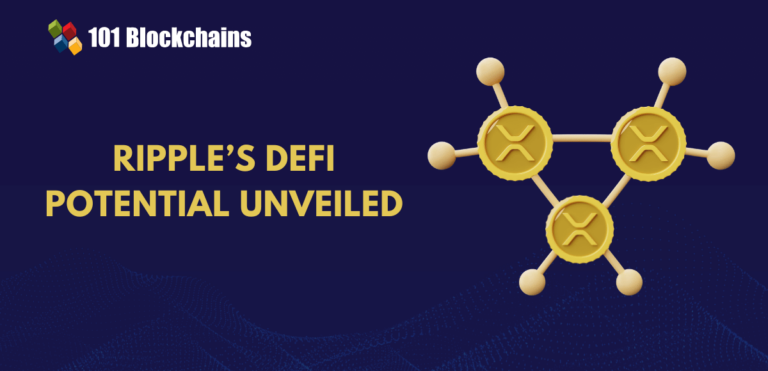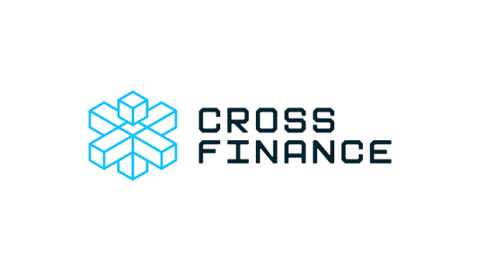Ripple is one of the notable names that has been thrown around a lot in discussions about the crypto space. It is a popular technology company that has created the XRP Ledger, a public blockchain and XRP, the native cryptocurrency of the blockchain. While news headlines talk about Ripple prediction for the next day, Ripple Labs has been actively involved in various initiatives. For starters, Ripple has collaborated with governments of five nations with many others in line for creating CBDC pilots. Ripple offers trusted blockchain and tokenization solutions tailored for digital asset custody, CBDCs, stablecoins and cross-border payments. Let us find out how Ripple is positioned to become the next big thing in DeFi.
Build your identity as a certified blockchain expert with 101 Blockchains’ Blockchain Certifications designed to provide enhanced career prospects.
Understanding the Involvement of Ripple with DeFi
Ripple has become one of the leading contenders to become a big player in the domain of decentralized finance. It has a crucial role in promoting DeFi with the facility of important tools and infrastructure required to develop new DeFi projects. You can notice that the XRP Ledger and the Ripple Transaction Protocol or RTXP have served as building blocks for various DeFi applications. Supporters of Ripple claim that the platform has been a prominent contributor to the growth of the DeFi ecosystem.
Ripple Protocols that Support DeFi
Ripple relies on the Ripple Transaction Protocol and the Ripple Protocol Consensus Algorithm for transferring fiat currency and digital currency across borders. The protocols serve a distinct role in providing cost-effective and faster cross-border payments.
You can find clear answers to ‘What is a DeFi in Ripple?’ by exploring the functionalities of the Ripple Transaction Protocol. It is an open-source protocol that uses the XRP ledger to support cross-border payments. The RTXP protocol serves a unique consensus mechanism, IOUs, pathfinding algorithm and gateways. IOUs represent the debt obligations between gateways and users and help in facilitating transactions. Gateways are the reliable currency exchange entities that serve as entry and exit points for transactions in the Ripple network.
The Ripple Protocol Consensus Algorithm is a consensus process that uses the design of Practical Byzantine Fault Tolerance algorithm. Nodes in the Ripple network that participate in the consensus process are validators. Validators should hold a specific amount of XRP tokens as security deposit in the network. It offers a more secure and lightweight consensus mechanism that can support DeFi operations.
The most promising protocol of Ripple that will have a crucial role in developing DeFi solutions is the Interledger Protocol or ILP. It is an open-source protocol that empowers transactions between different ledgers and payment networks. ILP leverages different components such as connectors, conditional payments, cryptographic unlocking mechanism and routing protocol. The components help in ensuring interoperable, secure and efficient transactions between different payment systems, thereby serving as the ideal option for DeFi.
Want to explore in-depth about DeFi protocol and its use cases? Enroll now in the DeFi Intermediate Level Course
Unraveling the Reasons to Pursue DeFi Development on Ripple
DeFi developers are likely to trust the Ripple blockchain for DeFi development as it offers different appealing advantages. An overview of the reasons for which developers select the XRP ledger for DeFi projects can help you understand how Ripple will be the next big thing in DeFi.
The XRP ledger is public and decentralized with the open-source capabilities allowing anyone to build on the ledger. The ledger is maintained by the Ripple community that provides support to DeFi developers. Companies, validators, users and developers in the Ripple community work together to enhance the XRP Ledger for DeFi.
Another promising trait of Ripple that supports DeFi development is the assurance of streamlined development. You can notice how the XRP ledger encourages innovation with multiple projects emerging in the Ripple ecosystem. On top of it, Ripple also provides different tools along with documentation that simplify development and reduce time to market.
The most interesting reason to build DeFi projects on the XRP Ledger of Ripple is the assurance of better performance. Ripple has gained significant popularity for faster transaction settlement within seconds. The transaction speed of Ripple is one of the reasons for which it is the popular choice for cross-border payments.
Enroll now in the DeFi Development Course to understand the best ways to use DeFi development tools like Solidity, React, and Hardhat.
Discovering the Utility of XRP Ledger in DeFi Development
The XRP Ledger provides tools and targeted innovations that speed up development and help in reducing time to market. It can serve as a valuable platform for creating a diverse range of DeFi solutions. You must know about the notable tools offered by the XRP Ledger to support DeFi development. The tools on XRP Ledger are classified into two categories, infrastructure and developer tooling. The infrastructure tools provide the basic foundation for creating DeFi solutions while developer tools help in adding distinctive functionalities.
-
Infrastructure Tools on XRP Ledger
You can notice the DeFi Ripple connection clearly in the different infrastructure tools available on the XRP Ledger. The infrastructure tools such as Bithomp, Gatehub, XRP Toolkit, XRPL.org Ledger Explorer, OnTheDex, XRPL Rosetta, Towo Labs and XRPScan. Each tool serves distinct functionalities that can help you create efficient DeFi applications with Ripple.
Bithomp is a specialized XRPL explorer and toolkit employed in different cryptocurrency exchanges. It was created in 2015 with the objective of offering a user-friendly XRPL explorer.
Gatehub is also another explorer tailored for the XRP Ledger. It helps in tracking the issuances of Gatehub on the XRP Ledger.
XRP Toolkit offers a dedicated platform to manage crypto assets and trading activities on the decentralized exchange of XRP Ledger.
XRPL.org Ledger Explorer is the preferred block explorer for the XRP Ledger that can offer transparency into the DeFi apps.
OnTheDex serves as a trusted source of information on live feeds of XRPL token activity. It provides the information about XRPL token activity to other aggregator sites.
XRPL Rosetta offers a promising infrastructure tool to create DeFi apps that can offer visualization of fiat data on the XRP Ledger.
Towo Labs is also a crucial infrastructure provider that helps in developing XRP Ledger and Interledger infrastructures. It primarily focuses on simplifying non-custodial crypto management.
XRPScan is the explorer and analytics platform tailored specifically for XRP Ledger. The platform offers a simple and transparent approach to view information about accounts, transactions and ledgers.
-
Developer Tools on XRP Ledger
The involvement of Ripple in decentralized finance also becomes evident due to the facility of developer tools on XRP Ledger. You can find tools such as Cryptum, Evernode, X-Tokenize and tools by 3ZY Labs. Let us find out what each tool has to offer for DeFi projects.
Cryptum is a powerful API/SDK platform that supports the integration of the XRP Ledger with any application, thereby enabling DeFi development.
X-Tokenize serve as a powerful command line tool that can ensure a simpler process for development, management and distribution of tokens on the XRP Ledger. It also plans to introduce facilities to create and distribute NFTs on the XRPL.
Evernode has emerged as a powerful resource for DeFi development. It is a scalable and permissionless layer 2 smart contract network developed on the XRP Ledger. The most important highlight of Evernode is the flexibility that is a must-have for DeFi solutions.
The most interesting player offering developer tools on the XRP Ledger is 3ZY Labs. It has developed SaaS solutions that blend web2 and web3 technologies along with marketing to improve user experience in DeFi. The platform plays a major role in ensuring secure and trustless DeFi transactions on the XRP Ledger.
Create new, high-level, innovative blockchain solutions for different industries as a highly-skilled blockchain developer with Blockchain Developer Career Path.
Serving a Powerful Decentralized Exchange
The XRP ledger stands out as a promising platform for DeFi development as it leverages the capabilities of the world’s oldest decentralized exchange. You must know that the DEX has been working continuously since the launch of XRP Ledger. The exchange serves as a testament to the Ripple prediction associated with DeFi development. The decentralized exchange helps in buying and selling crypto tokens with minimal fees that works perfectly for DeFi solution. It is important to note that the decentralized exchange of XRP Ledger includes multiple currency pairs. The DEX also offers transparency with on-demand tracing when users have to make transactions.
Another notable feature of the XRP Ledger that supports DeFi development is the ability to make cross-currency payments. Cross-currency payments in the XRP Ledger provide a strong reason to boost DeFi activity. It is also important to note that cross-currency payments on XRP Ledger can deliver a variable amount in a specific sending limit.
Final Thoughts
The use of Ripple for developing DeFi applications will focus on algorithmic trading, facility of decentralized exchanges and tools. You must note that Ripple blockchain offers infrastructure and developer tools with the XRP Ledger along with a decentralized exchange to support DeFi activities. It is also important to note the benefits of XRP Ledger for developers such as faster transactions, open-source development and dedicated community.
As the speculations about involvement of XRP Ledger in CBDC development continue gain momentum, DeFi developers may also search for opportunities. The functionalities of tools offered by XRP Ledger offer proof of the fact that Ripple is a strong contender for developing DeFi solutions. Discover more insights on the functionalities of Ripple as a suitable choice for DeFi development right now.
*Disclaimer: The article should not be taken as, and is not intended to provide any investment advice. Claims made in this article do not constitute investment advice and should not be taken as such. 101 Blockchains shall not be responsible for any loss sustained by any person who relies on this article. Do your own research!






